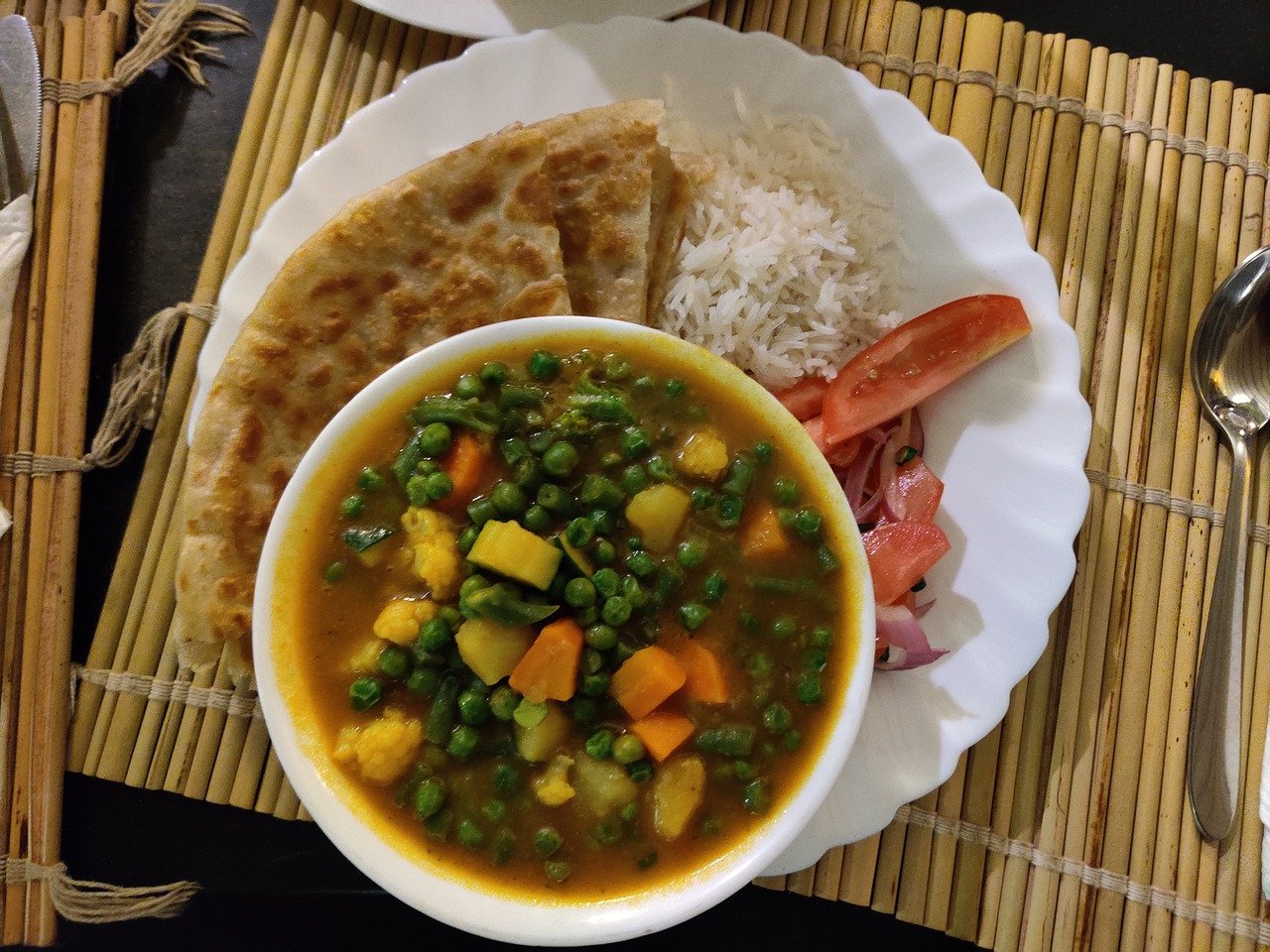Image Credit: Umulay on Pixabay
If you’re learning Swahili, chakula food is one of the things you’ll probably need to – or at least want to – talk about. So in this post, let’s dig in to some vocabulary for food, cooking, and meals.
Ninahisi njaa! I’m hungry!
Let’s start with things you might want to say before you have something to eat or drink.
- Nina njaa.
I’m hungry. - Ninahisi njaa.
I feel hungry.
- Nina kiu.
I’m thirsty. - Ninahisi kiu
I feel thirsty. - Nataka kula.
I want something to eat. - Nataka kitu cha kunywa.
I want something to drink. - Nataka vitafunio.
I want a snack.
Chakula cha jioni ni tayari! Dinner is ready!
The meals in Swahili are kifungua kinywa (breakfast), chakula cha mchana (lunch), and chajio (dinner). A snack is kitafunio.
- Nini cha kifungua kinywa?
What’s for breakfast? - Nini cha chakula cha mchana.
What’s for lunch? - Nini cha chajio?
What’s for dinner? - Nini cha kitindamlo?
What’s for dessert? - Mimi hula kifungua kinywa mapema.
I eat breakfast early. - Mimi hula chakula cha mchana na wenzangu.
I eat lunch with colleagues. - Mimi hula chajio na familia yangu.
I eat dinner with my family.
Katika mkahawa. At a restaurant.
If you go to a restaurant, these expressions may come in handy.
- Meza ya mmoja/wawili/watatu/wanne/watano, tafadhali.
A table for one/two/three/four/five, please. - Je, una nafasi?
Do you have a reservation? - Nina nafasi. Tuna nafasi.
I have a reservation. We have a reservation. - Sina nafasi. Hatuna nafasi.
I don’t have a reservation. We don’t have a reservation. - Je! Unayo menyu?
Do you have a menu? - Je! Unayo menyu kwa Kiingereza?
Do you have a menu in English? - Je unayo orodha ya mvinyo?
Do you have a wine list? - Uko tayari kuagiza?
Are you ready to order? - Niko tayari kuagiza. Tuko tayari kuagiza.
I’m ready to order. We’re ready to order. - Siko tayari kuagiza. Hatuko tayari kuagiza.
I’m not ready to order. We’re not ready to order. - Dakika chache zaidi, tafadhali.
A few more minutes, please. - Je, unapendekeza nini?
What do you recommend? - Je, ninaweza kupata kitambaa cha mkono/uma/kisu/kijiko/vijiti vya kulia?
Could I have a napkin/fork/knife/spoon/chopsticks? - Je, ninaweza kupata glasi ya maji?
Could I have a glass of water? - Angalia, tafadhali.
Check, please. - Nitalipia wapi?
Where do I pay?
Mimi ni wa mboga. I’m vegetarian.
If you’re on any kind of restricted diet, you may need to know these helpful expressions before you order.
- Niko kwenye lishe.
I’m on a diet. - Mimi ni wa mboga. Sili nyama au samaki.
I’m vegetarian. I don’t eat meat or fish. - Mimi ni wa mboga mboga. Sili bidhaa yoyote ya wanyama.
I’m vegan. I don’t eat any animal products. - Sili gluten.
I don’t eat gluten. - Nina mzio wa karanga.
I’m allergic to peanuts. - Nina mzio wa bidhaa za maziwa.
I’m allergic to dairy products. - Nina mzio wa karanga za miti.
I’m allergic to tree nuts. - Nina mzio wa samakigamba.
I’m allergic to shellfish. - Sinywi pombe.
I don’t drink alcohol. - Sinywi kafeini.
I don’t drink caffeine. - Hii chakula ni kosher?
Is this food kosher? - Hii chakula ni halali?
Is this food halal?
Bila viungo vingi! Not too spicy!
People can tolerate different levels of heat in their food, so you may want to say:
- Ina viungo?
Is this spicy? - Napenda chakula cha viungo.
I like spicy food. - Sipendi chakula cha viungo.
I don’t like spicy food. - Chenye viungo vingi tafadhali.
Very spicy, please. - Mchuzi wa wastani, tafadhali.
Medium spicy, please. - Isiwe na viungo tafadhali
Not spicy, please. - Ina viungo vingi sana
It’s too spicy.
Chakula chako kiko vipi? How’s your food?
The four basic tastes are chenye chumvi nyingi (salty), tamu (sweet), chungu (bitter), chachu (sour). But if someone asks how your food is, you’ll probably want know a bit more than that.
- Ni kitamu.
It’s delicious. - Ni nzuri.
It’s great. - Chakula hiki ni bora.
This food is excellent. - Ni moto sana.
It’s too hot. - Ni baridi sana.
It’s too cold. - Ni tamu sana.
It’s too sweet. - Ina chumvi nyingi.
It’s too salty. - Haina ladha.
It’s tasteless. - Imepikwa kupita kiasi.
It’s overcooked. - Haijaiva.
It’s undercooked. - Ni mafuta.
It’s oily/greasy.
Ninapenda kupika. I like to cook.
Sometimes, it’s nice to stay in and cook, especially if wewe ni mpishi mzuri (you’re a good cook.) Here are some basic vocabulary and expressions for cooking.
- Nitaenda kupika chakula cha jioni.
I’m going to cook dinner. - Hii ni resipe rahisi/ngumu.
This is an easy/hard recipe. - Nahitaji kununua viungo.
I need to buy the ingredients. - Ninachemsha maji.
I’m boiling water. - Ninapika wali/tambi/viazi.
I’m cooking rice/pasta/potatoes. - Ninakaanga mboga/kuku/samaki.
I’m frying vegetables/chicken/fish. - Ninaoka mkate/vidakuzi/keki.
I’m baking bread/cookies/a cake. - Ninachoma nyama ya kondoo/kuku/ng’ombe.
I’m roasting lamb/chicken/beef. - Ninachoma samaki/kuku/mboga.
I’m grilling fish/chicken/vegetables. - Ninachanganya viungo.
I’m mixing the ingredients. - Ninachochea mchuzi.
I’m stirring the sauce. - Ninaongeza chumvi / sukari / maji / mitishamba/ viungo.
I’m adding salt/sugar/water/herbs/spices.
Furahia mlo wako! Enjoy your meal!
Do you want to learn Swahili?
Check out our other posts on Swahili language, culture, and more. And if you’re looking for convenient and affordable live Swahili lessons with a real teacher, check out The Language Garage Swahili. Our lessons are given online in a virtual classroom, so it doesn’t matter where you live or work. We can come to you. And we have flexible options, with a free trial so that you can decide if there’s a fit. Check us out!






